

Building a dictionary for an economics of the commons. Lifezones By Peter Halasz [CC-BY-SA-2.5-2.0-1.0 ], via Wikimedia Commons This is a proposal in response to “Help us build a dictionary on commons economics!”
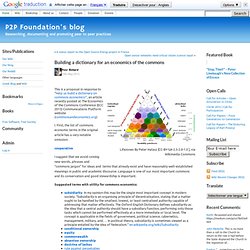
, an article recently posted at The Economics of the Commons Conference (ECC 2013) Communications Platform website (commonsandeconomics.org) I. Principles for this Next Edge. We are exploring here the conceptual territory of the next edge and holding open the space for a range of worldviews and possibilities. We will do our best to ensure the highest level of diversity and stay clear from any specific ideology or preferred path. Most if not all of the editors and admins here have experience with solo-blogging.
To test the next edge they experiment with simple principles. Anyone may write a draft, anyone else not involved in this draft may release it for publication. Why: to maintain impartiality through peer-review. Co-authors respect prior art, even if it is just released for a minute. The Commons: Year One of the Global Commons Movement « CommonsBlog. As promissed I finally post my speech (full length) for the Burning Ice Un-Economic Summit.
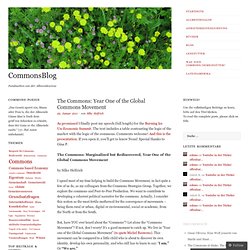
The text includes a table contrasting the logic of the market with the logic of the commons. Comments welcome! And this is the presentation. If you open it, you’ll get to know Nessi! Special thanks to Gina P. L.php?u=http%3A%2F%2Fwww.scoop. Metal, code, flesh: Why we need a 'Rights of the Internet' declaration. How the digital blob feasts on our intimate data. Andrew Keen describes social media as a relentless digital blob that feeds on our friendships.

Digital commentator Andrew Keen says social networking is a virus that feeds on intimate data He says hysteria over apps that surreptitiously access data exposes wider problem in industry Accessing lists of our friends is the crack cocaine of the social networking industry, Keen argues Editor's note: Andrew Keen is a British-American entrepreneur and professional skeptic. World Wide We. Change Tribes around the World. Internet Makes Smart People Smarter, Dumb People Dumber. Internet Freedom Fighters Build a Shadow Web: Scientific American. Book of the Day: The Good of Everyone. The Sharing Economy as a Way Out of the Crisis. This is a very important book, in the process of being translated from the Italian: Enrico Grazinni: “The thesis of this book is that, to overcome the current dramatic economic and ecological crisis, it is necessary to create and develop a polycentric economy based on common goods and not just on market monoculture or state intervention1.
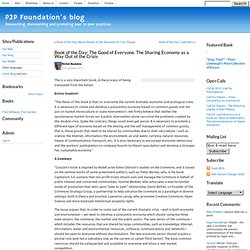
We firmly believe that neither the spontaneous market forces nor a public intervention alone can solve the problems created by this double crisis. Quite the contrary, things could even get worse. It is necessary to promote a different type of economy based on the sharing and the self management of common goods, that is, those goods that need to be shared by communities due to their very nature – such as science, the Internet, information, the environment, air and water, currency, natural resources, means of communication, transport, etc.. A Summary In short, Grazzini’s essay: * ecology is an evident case of “market failure”.
The historic convergence of #OccupyWallStreet and the Commons started at the Making Worlds conference. Like the Occupy protests last year, this gathering did not focus on what government might do for the American people.
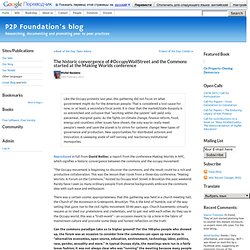
That is considered a lost cause for now, or at least, a secondary focal point. It is clear that the market/state duopoly is so entrenched and collusive that “working within the system” will yield only piecemeal, marginal gains. As the fights on climate change, finance reform, food, energy and countless other issues have shown, the only way to really meet people’s needs and save the planet is to strive for systemic change: New types of governance and production.
New opportunities for distributed activism and innovation. A sweeping aside of self-serving and reactionary institutional monopolies. What is free software? What is free software?
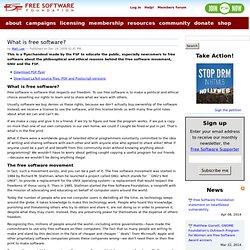
Free software is software that respects our freedom. To use free software is to make a political and ethical choice asserting our rights to learn and to share what we learn with others. Usually software we buy denies us these rights, because we don't actually buy ownership of the software. Instead, we receive a license to use the software, and this license binds us with many fine-print rules about what we can and can't do. If we make a copy and give it to a friend, if we try to figure out how the program works, if we put a copy on more than one of our own computers in our own home, we could if caught be fined or put in jail. What if there were a worldwide group of talented ethical programmers voluntarily committed to the idea of writing and sharing software with each other and with anyone else who agreed to share alike?
The shared patterns of indigenous culture, permaculture and digital commons. Rarely have I read an essay that knits together some very different commons with such wisdom and depth.
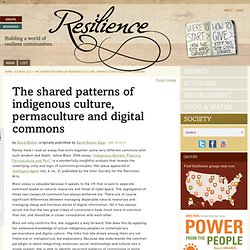
Joline Blais' 2006 essay, “Indigenous Domain: Pilgrims, Permaculture and Perl,” is a wonderfully insightful analysis that reveals the underlying unity and logic of commons principles. Her piece appeared in Intelligent Agent (vol. 6, no. 2), published by the Inter-Society for the Electronic Arts. Blais' essay is valuable because it speaks to the rift that is said to separate commons based on natural resources and those of cyberspace. The segregation of those two classes of commons has always bothered me. There are of course significant differences between managing depletable natural resources and managing cheap and limitless stores of digital information. Peer2Politics. About. I am an author, activist, blogger and consultant who spends a lot of time exploring the commons as a new paradigm of economics, politics and culture.
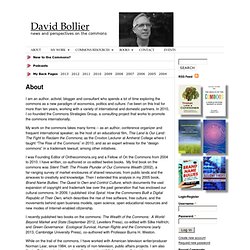
I've been on this trail for more than ten years, working with a variety of international and domestic partners. Community Domain - Permaculture - Blais. Pumpkins Pilgrims The intertwining of these three cultural responses to the Intellectual Property regimes is complex, but we might begin tracing their development by telling a story about pumpkins.
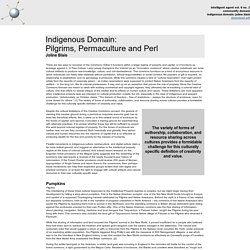
First is the Native American pumpkin, one of the first New World foods brought to Europe, and symbol of a supposed Thanksgiving harvest celebrated by Pilgrims and Native Americans. Behind the myth is a history of two related but disparate commons, both at risk in the narrative of progress unleashed in North America – the commons of the Native Americans who saved the Pilgrims by teaching them how to survive in the Northeast, and the dwindling commons in Britain whose defenders were rioting against the enclosures enacted by their own Puritan elite.
One of the Native American commons was the free sharing of information about planting, navigation, fishing, medicine and local dangers that Tisquantum, a Patuxet Indian, taught the Pilgrims during his year living with them. Figure 1. Figure 2. . [6] Exit-Based Empowerment. = an aspect of Peer Governance related to Forking, tempering the power of the Benevolent Dictator aspect Source: Book: Multi-Stakeholder Governance and the Internet Governance Forum.
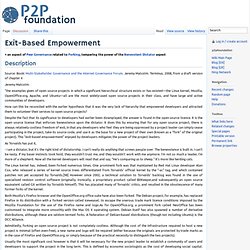
Jeremy Malcolm.